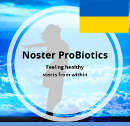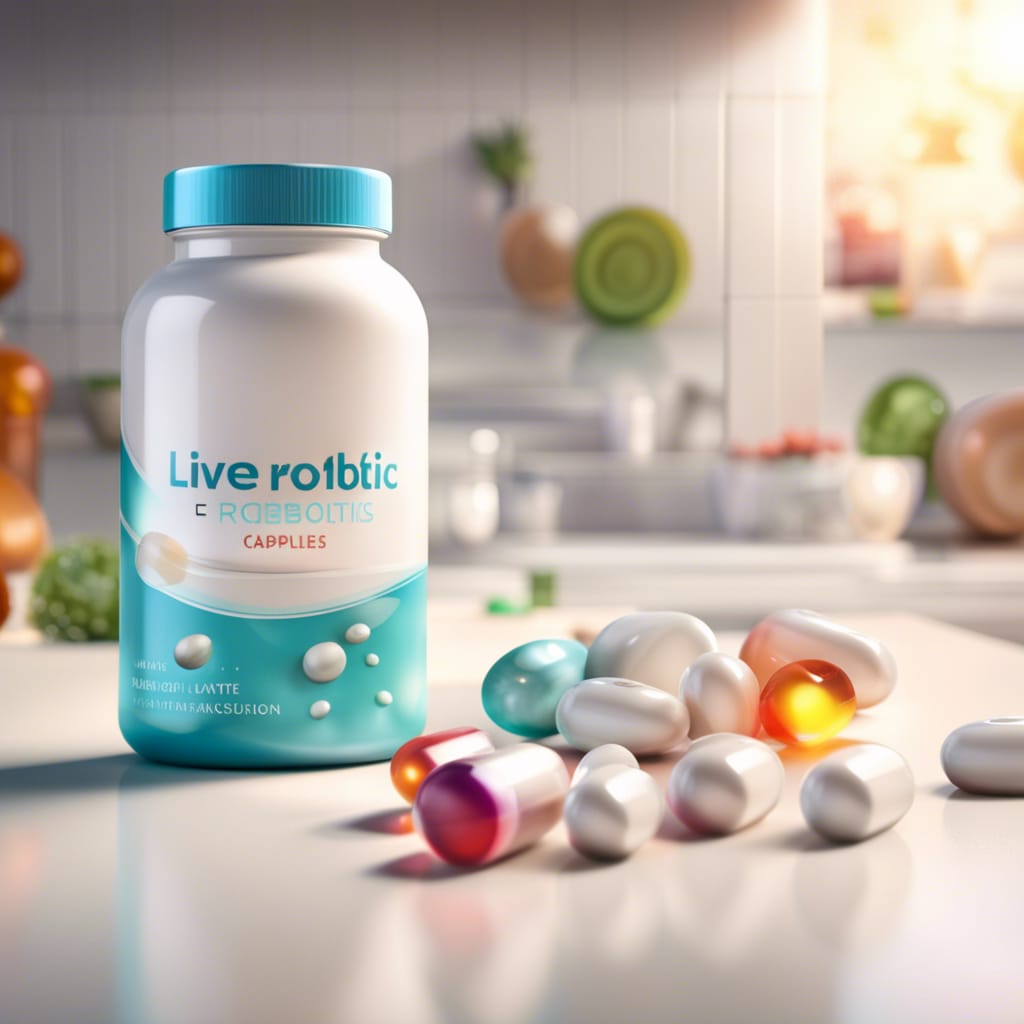How Live Probiotics Work?
Introduction
How live probiotics work? If you’re a health enthusiast looking to understand the magic behind these tiny living organisms, you’re in the right place! In this blog post, we’ll delve into the fascinating world of live probiotics and uncover their secrets. So grab a cup of your favourite beverage, sit back, and get ready to discover the inner workings of these beneficial bacteria. Let’s jump right in!
What are Live Probiotics?
Benefits of Live Probiotics
How live probiotics work is by offering a range of unique benefits compared to regular probiotics:
-
Enhanced Survival: Live probiotics contain active cultures that have a better chance of surviving the digestive process, reaching the gut alive, and exerting their positive effects. This improves their ability to enhance gut health and promote a balanced microbiome.
-
Immune Boost: Live probiotics go beyond gut health; they can also bolster the immune system. They stimulate antibody production and support immune cell activity, contributing to a stronger defence against illnesses.
-
Digestive Relief: Live probiotics can help alleviate common digestive issues like bloating, gas, and constipation. They achieve this by promoting healthy digestion and improving nutrient absorption.
-
Mental Well-being: Surprisingly, live probiotics have been linked to improved mental health and mood regulation. This suggests their potential role in supporting overall well-being and emotional balance.
-
Weight Management: Live probiotics may even aid in weight management and maintaining a healthy body composition. Their influence on gut health can indirectly impact weight-related factors.
Choosing live probiotics can maximize these benefits and potentially transform your health for the better.
Types of Live Probiotics
Various types of live probiotics can provide a boost to your gut health. One popular type is Lactobacillus acidophilus, which is commonly found in yoghurt and fermented foods. Another well-known strain is Bifidobacterium lactis, which is often used in supplements and can help support digestion. If you’re looking for a probiotic that can survive stomach acid and reach your intestines, Saccharomyces boulardii might be a good option. This beneficial yeast can help restore the natural balance of your gut flora. Lastly, don’t forget about Streptococcus thermophilus, which is commonly found in dairy products and can aid in lactose digestion. Remember, opting for live probiotics can have a more potent impact on your gut health compared to regular probiotics.
The Immune System and Probiotics
Understanding the Immune System
Probiotics, also known as “good bacteria,” have been gaining popularity among health enthusiasts for their potential benefits to the immune system. The immune system is our body’s natural defence mechanism against harmful pathogens and infections. It consists of a complex network of cells, tissues, and organs working together to keep us healthy. Probiotics, when consumed in adequate amounts, can help support and strengthen our immune system. These beneficial bacteria have been shown to modulate the immune response, promoting the production of antibodies and enhancing the activity of immune cells. By understanding the role that probiotics play in supporting our immune system, we can make informed choices to incorporate them into our daily routine for better overall health.
How Probiotics Interact with the Immune System, How Live Probiotics Work
Probiotics play a crucial role in regulating our immune system. These beneficial bacteria have been shown to have a direct impact on our body’s defences, helping to strengthen and balance our immune response. By interacting with immune cells in our gut, probiotics can enhance the production of antibodies, which are essential for fighting off harmful pathogens. Additionally, they can influence the activity of immune cells, such as natural killer cells and T-cells, promoting a more robust defence against infections. Furthermore, probiotics have been found to reduce inflammation, a key factor in many immune-related disorders. So, incorporating probiotics into our diet or taking them as supplements can effectively support our immune system and help maintain overall health.
The Journey of Live Probiotics
Surviving the Digestive System
The journey of live probiotics surviving the digestive system is a fascinating process. These beneficial bacteria embark on a remarkable adventure through our gut, starting from our mouth and ending in the colon. As we consume probiotic-rich foods or supplements, these tiny warriors pass through the acidic environment of our stomachs, which can be a challenging obstacle. However, some strains are resilient enough to withstand this harsh condition and make their way into the small intestine. Here, they encounter bile acids and digestive enzymes, but their mission remains intact. Finally, they reach the large intestine, where they establish colonies and contribute to our gut health. It’s incredible how these live probiotics navigate their way, strengthening our digestive system and promoting overall well-being.
through our gut, starting from our mouth and ending in the colon. As we consume probiotic-rich foods or supplements, these tiny warriors pass through the acidic environment of our stomachs, which can be a challenging obstacle. However, some strains are resilient enough to withstand this harsh condition and make their way into the small intestine. Here, they encounter bile acids and digestive enzymes, but their mission remains intact. Finally, they reach the large intestine, where they establish colonies and contribute to our gut health. It’s incredible how these live probiotics navigate their way, strengthening our digestive system and promoting overall well-being.
Reaching the Gut: The Journey of Live Probiotics
The journey of live probiotics through the digestive system is an extraordinary and complex process, akin to a heroic quest. These tiny microorganisms face numerous challenges along the way, but their ultimate destination is the gut, where they can contribute to your overall well-being. Here’s what happens when live probiotics reach their final destination:
1. Surviving the Stomach:
- The adventure begins in the stomach, which has a highly acidic environment designed to break down food. This harsh acidity can be a significant obstacle for live probiotics. However, some resilient strains are equipped to withstand this acidic onslaught. These probiotics are often encapsulated in protective layers or naturally possess a robust outer structure that shields them from stomach acid.
2. Entering the Small Intestine:
- If the live probiotics successfully pass through the stomach, they enter the small intestine. Here, they encounter bile acids and digestive enzymes produced by the pancreas. These substances are essential for digesting fats and other nutrients in our food. Despite these challenges, certain probiotic strains are capable of navigating through this environment and remain viable.
3. Colonizing the Large Intestine:
- The ultimate goal of live probiotics is to reach the large intestine, also known as the colon. This is where they can have the most significant impact on your gut health. Once in the colon, probiotics can establish colonies and thrive in the gut microbiome. They contribute to the diverse ecosystem of beneficial bacteria in your gut, which is crucial for digestion, nutrient absorption, and overall well-being.
4. Promoting Gut Health, How Live Probiotics Work:
- Once settled in the large intestine, live probiotics get to work. They help maintain a balanced microbiome by competing with harmful bacteria for resources and space. This competition can help prevent the overgrowth of pathogenic bacteria that can lead to digestive issues and other health problems.
5. Enhancing Digestive Function:
- Live probiotics also play a role in supporting healthy digestion. They can aid in breaking down complex carbohydrates and improving nutrient absorption. This can be particularly beneficial for individuals who experience digestive discomfort, such as bloating or gas.
6. Boosting Overall Well-being:
- Beyond their digestive benefits, live probiotics have been associated with improved overall health. Some strains have been linked to better immune function, mental well-being, and even weight management. Their presence in the gut can have far-reaching effects on various aspects of your health.
The journey of live probiotics through the digestive system is a remarkable process filled with challenges and triumphs. These beneficial bacteria are equipped to withstand the harsh conditions of the stomach and small intestine, ultimately reaching the colon where they can flourish and positively impact your gut health and overall well-being. By incorporating live probiotics into your diet, you support this incredible journey and harness their potential benefits for a healthier you.
Effectiveness and Efficacy of Live Probiotics
Effectiveness and efficacy are crucial when it comes to live probiotics because these determine how well they can deliver their intended health benefits. Here’s what you need to know:
What is Effectiveness?
- Effectiveness refers to how well live probiotics work in achieving their intended goals, such as improving gut health, supporting the immune system, or alleviating digestive issues. Essentially, it’s a measure of how successfully probiotics can deliver their promised benefits.
What is Efficacy?
- Efficacy is similar to effectiveness but typically focuses on the outcomes of scientific studies or clinical trials. It assesses how well live probiotics perform under controlled conditions and whether they produce the desired results. High efficacy indicates that probiotics consistently deliver positive outcomes.
Factors Affecting Probiotic Efficacy
Several factors can influence how well live probiotics work and their overall efficacy. Understanding these factors can help you make informed choices:
1. Strain Specificity:
- Different probiotic strains have distinct properties and may target specific health issues. Choosing the right strain for your needs is essential. For instance, Lactobacillus acidophilus may be more effective for digestive health, while Bifidobacterium lactis could be better for immune support.
2. Dosage and Duration:
- The amount of live probiotics you consume and how long you take them can impact their effectiveness. Higher doses may be needed for certain conditions, and consistency in consumption is often key to seeing results.
3. Quality and Purity:
- The quality of the probiotic product matters. Look for reputable brands that guarantee the purity and potency of their live probiotics. Cheap or poorly manufactured supplements may not provide the desired benefits.
4. Health Condition:
- The specific health issue you’re addressing can affect efficacy. Probiotics may work differently for conditions like irritable bowel syndrome (IBS) compared to general gut health maintenance.
5. Individual Variability:
- People’s responses to live probiotics can vary due to their unique microbiomes and genetics. What works well for one person may not have the same effect on another.
6. Lifestyle and Diet:
- Your overall lifestyle and diet play a role. A balanced diet rich in fibre and prebiotic foods can create a more favourable environment for probiotics to thrive.
Ensuring Probiotic Viability
For live probiotics to be effective, they must remain viable (alive) throughout their journey from production to consumption:
1. Storage:
- Proper storage is crucial. Keep live probiotics in a cool, dry place away from direct sunlight and extreme temperatures. Refrigeration may be necessary for some specific strains.
2. Expiry Date:
- Check the expiry date on probiotic products. Using them past their expiration date may result in diminished viability and efficacy.
3. Protective Packaging:
- Some probiotics come in special packaging designed to protect them from moisture and oxygen, which can degrade their viability.
4. Avoid Heat and Humidity:
- Exposure to heat and humidity can kill probiotics. Be cautious when storing probiotic supplements in bathrooms or kitchens where humidity levels can be high.
5. Follow Instructions:
- Always follow the usage instructions provided on the probiotic product’s packaging. This includes dosage recommendations and any specific storage instructions.
The effectiveness and efficacy of live probiotics depend on various factors, including strain specificity, dosage, product quality, health condition, and individual variability. To ensure probiotic viability, store them correctly, check expiration dates, and follow usage instructions diligently. By considering these factors, you can maximize the benefits of live probiotics for your health and well-being.
Conclusion
Live probiotics are not just a health trend; they are tiny superheroes that work wonders for your well-being. Understanding how these beneficial bacteria interact with your immune system and navigate the digestive system can help you make informed choices about your health. So, if you’re aiming for a healthier gut, improved immunity, and overall well-being, consider incorporating live probiotics into your daily routine. These microscopic warriors are ready to make a big difference in your life.
FAQs about Live Probiotics
1. Can I get live probiotics from food alone, or do I need supplements?
- While some foods contain live probiotics, supplements can provide a more concentrated dose. Depending on your needs and dietary preferences, you can choose either or both.
2. Are there any side effects of consuming live probiotics?
- In most cases, live probiotics are safe for consumption. However, some individuals may experience mild digestive discomfort initially. It’s essential to start with a low dose and consult a healthcare professional if you have concerns.
3. How long does it take to see the benefits of live probiotics?
- The timeline varies from person to person. Some individuals notice improvements in digestion and immunity within a few weeks, while others may take longer. Consistency in consumption is key.
4. Can live probiotics help with specific health conditions, such as irritable bowel syndrome (IBS) or allergies?
- Live probiotics may offer relief for certain conditions, but their effectiveness can vary. It’s best to consult with a healthcare provider for personalized guidance.
5. What’s the best way to store live probiotics to maintain their potency?
- Store live probiotics in a cool, dry place, away from direct sunlight and high temperatures. Follow the storage instructions on the product packaging for optimal results.

